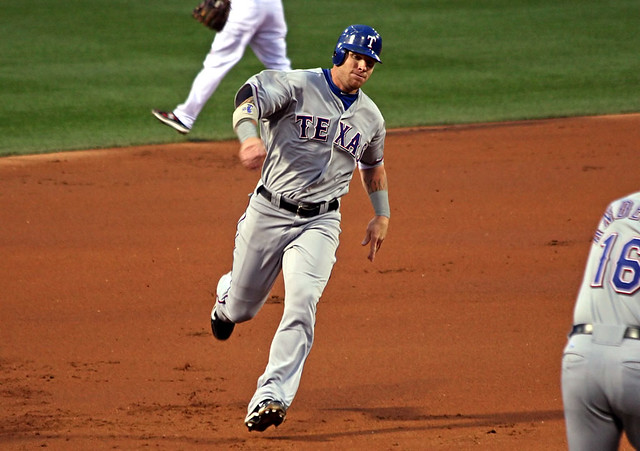
Josh Hamilton (Photo: Samara Pearlstein)
It seems a foregone conclusion that the Red Sox will attempt to re-sign David Ortiz for at least one more season at DH. However, an intriguing alternative to Big Papi comes in the form of one Joshua Holt Hamilton.
Hamilton’s life story reads like a movie, and one may be made of it by Casey Affleck. Hamilton was selected by the (then) Devil Rays as the first player chosen in the 1999 draft. He broke out in 2000, hitting .301 with 13 homers and 61 ribeyes in 96 games. He was named as the South Atlantic League MVP of its All-Star Game, and was on the 2000 All-Star Futures Game roster. However, his life was about to spin out of control.
Before the 2001 season, Hamilton was involved in an auto accident in which his parents were hurt. Soon after this incident, Hamilton started abusing alcohol and drugs. During spring training in 2003, Hamilton failed his first drug test. In 2004, Hamilton was suspended from baseball for repeated positive drug tests. Hamilton did not play organized baseball from 2004 until 2007. After being confronted by his grandmother in 2005, Hamilton started trying to get sober.
The Rays left him off of its 40-man roster in 2007, so the Cubs (selecting for the Reds) drafted him in the Rule 5 Draft and immediately traded him to the Reds. Hamilton hit .292/.368/.554, .390 wOBA, 130 wRC, with 19 homers and 47 RBI in 90 games. After the season, the Reds traded him to the Texas Rangers for Edinson Volquez and Daniel Ray Herrera.
2008 was the year when Hamilton hit the national stage in a big way. For the season, Hamilton hit .304/.371/.530, .384 wOBA, 132 wRC with 32 homers and league-leading 130 RBI. However, the highlight of Hamilton’s season occurred during an exhibition. Participating in the Home Run Derby at the All-Star Game, Hamilton put on a performance that few will ever forget. Hamilton hit 28 homers in the first round and 35 overall, losing in the final round to Justin Morneau. Yankee Stadium echoed thunderously with the chant of “Hamilton! Hamilton! Hamilton!”
Hamilton was at his best in the 2010 season. Hamilton’s numbers were video-game-on-rookie-setting gaudy: .359/.411/.633, .445 wOBA, 175 wRC, with 32 homers and 100 RBI in 133 games. Hamilton led the league in batting average, slugging and OPS, and was selected as the Most Valuable Player in the American League.
Tragedy found Josh in 2011. On July 7th, a Rangers fan reaching out to catch a ball that Hamilton tossed into the crowd leaned too far over the railing and fell 20 feet to the ground. The fan died while being transported to the hospital.
In 2012, Hamilton hit .285/.354/.577, .387 wOBA, 140 wRC, with a career-high 43 homers and 120 RBI and an absolutely sick .292 isolated power mark. But Hamilton’s power came at a cost: he struck out a career high 162 times (against 60 walks).
David Ortiz is beloved in Boston but he will be 37 years old at the start of next season, while Hamilton will be 31 (he turns 32 in May). Ortiz wants a two-year deal from the Red Sox. Big Papi’s production isn’t declining yet but he notably missed the final month of the season due to an injury to his Achilles tendon. So the Red Sox have to decide whether to risk whether Ortiz’s decline will occur within the next two years (somewhat likely) as opposed to giving a long-term deal to Hamilton (whose production isn’t slowing down in the least). Additionally, Hamilton plays all three outfield positions, so he wouldn’t strictly be a designated hitter (although it might be wise to use him as a DH exclusively in the later years of his new contract). This gives the Red Sox lineup advantages over having Ortiz as DH, as Papi time playing first base seems over.
All of this will be weighed against dealing with Hamilton’s recovery from drug and alcohol addiction. Hamilton has had two incidents since declaring his sobriety where he admittedly drank alcohol (one in 2009 and another in 2012). Hamilton is tested for drugs three times a week and has passed every drug test since returning to the majors.
Also in the calculation is the changes to free agency in the new Collective Bargaining Agreement. For the Red Sox to obtain compensation for losing Ortiz, they would have to make him a qualifying offer of $13.3 million for one year. Ortiz wants a two-year deal but might accept the qualifying offer. Assuming he declines the qualifying offer and signs somewhere else, Boston will receive the first-round selection of whichever team selects him, if that team was not one of the worst nine teams in baseball in 2012.
And therein lies the rub: Boston is one of those nine teams (the others are the Astros, Cubs, Rockies, Twins, Indians, Marlins, Royals and Blue Jays – the Pirates also have a protected pick for failing to sign Mark Appel). If the Red Sox sign a free agent that declined to sign a qualifying offer (as Hamilton certainly would so decline), they would not have to surrender their-first round pick as compensation – they would surrender their next highest pick. The Red Sox (hopefully) won’t be in this position too often, so it might behoove them to take advantage of the only fruit of their disaster of a 2012 season.
After trading away Adrian Gonzalez, Josh Beckett and Carl Crawford, will the Red Sox jump right back into free agency with the signing of Josh Hamilton? David Ortiz is a sparkling reminder of the glories of Red Sox past. But Josh Hamilton could be the catalyst for a fantastic Red Sox future.
